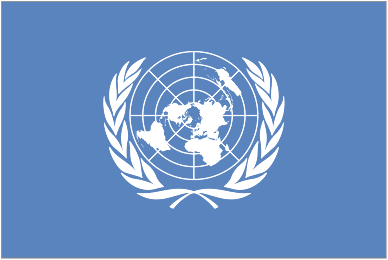
UN Secretary-General Ban Ki-moon reiterated his support for the new Joint Special Representative of the United Nations and the League of Arab States on the Syrian crisis, Lakhdar Brahimi, adding that he would count with the full backing of the international community when he assumes his position on 1 September.
“You have all the respect and full support of the international community,” Mr. Ban told Mr. Brahimi at UN Headquarters. “It is crucially important that the Security Council and all the United Nations systems support your role.”
Syria has been wracked by violence, with more than 17,000 people, mostly civilians, killed since the uprising against President Bashar al-Assad began some 17 months ago. Over recent days, there have been reports of an escalation in violence in many towns and villages, as well as the country’s two biggest cities, Damascus and Aleppo.
Speaking before a private meeting, Mr. Ban said Mr. Brahimi has a very important and crucial task to bring peace and stability to Syria, and to promote human rights there. He also praised Mr. Brahimi’s talent and expertise on the region, which he will bring to his new position.
“The longer this fighting goes on the more people will be killed, the more people will suffer. In that regard, your contribution, your leadership, will be very important,” Mr. Ban said.
Mr. Brahimi, an Algerian national, has served the UN in various high-level roles over the past two decades, including heading the UN Assistance Mission in Afghanistan (UNAMA), serving as an advisor on a range of issues, and chairing an independent panel on peacekeeping operations which released its keynote findings, known as the ‘Brahimi Report,’ in 2000. Mr. Brahimi also served with the League of Arab States from 1984 to 1991 as an Algerian diplomat.
In their exchange, Mr. Brahimi thanked the Secretary-General for the opportunity to serve the Syrian people, and stressed that they would be his “first masters,” and that he would consider their interests first and foremost.
Appointed last week, Mr. Brahimi is taking over the peace-facilitation role which has been carried out since February by former UN Secretary-General Kofi Annan, who provided his good offices on behalf of the UN and Arab League, with the aim of bringing an end to all violence and human rights violations in Syria, and promoting a peaceful solution to the conflict. Mr. Annan’s mandate ends on 31 August.
Meanwhile, clashes in Lebanon are hurting refugee relief efforts. The deteriorating security situation in Lebanon this week has made it increasingly difficult to provide assistance to thousands of Syrians seeking asylum in the neighboring country, the United Nations refugee agency said today.
“Clashes between rival neighborhoods in Tripoli continue, and this has affected the pace of registration from our newly established centre in the city,” a spokesperson for the Office of the UN High Commissioner for Refugees (UNHCR), Adrian Edwards, told a media briefing in Geneva.
“The registration center was open until yesterday with reduced staff as about half of them live in areas affected by shooting. Today, however, we’ve had to close the centre temporarily for security reasons,” Mr. Edwards said, adding that UNHCR would continue its operations despite the security challenges.
Syria has been wracked by violence, with an estimated 17,000 people, mostly civilians, killed since the uprising against President Bashar al-Assad began some 17 months ago. According to media reports, fighting between supporters and opponents of the Syrian Government in the Lebanese capital, Beirut, has killed more than 12 people this week, and there has been an increase in tensions in other parts of the country, such as the northern city of Tripoli.
The registration of refugees has also been affected in the Bekaa valley, located along the border with Syria in eastern Lebanon, in the wake of recent kidnappings of Syrians in the area. “As a protection measure for the refugees, we are avoiding large gatherings of Syrians at registration and distribution points in some areas though assistance continues in a modified way,” Mr. Edwards said.
Some 51,000 Syrians have registered or applied to register with UNHCR in Lebanon. One of the refugee agency’s key concerns is to identify and rehabilitate alternative shelters for the growing number of people staying in schools, which are due to resume classes next month.
Mr. Edwards said the refugee agency has identified abandoned schools and hopes to relocate some 500 people in the Bekaa valley in the coming fortnight. “Across Lebanon, UNHCR has been continuing its back-to-school drive and yesterday met with school directors in Halba Public School in the north to identify places for refugee children,” he said.
Overall, the total number of Syrian refugees registered or awaiting registration with UNHCR currently stands at 202,512.
UNHCR is also continuing its operations in Turkey, Jordan, Iraq and Syria, the spokesperson added. In Turkey, the country hosting the largest number of Syrian refugees, seven new camps are being built, which will bring the total number of camps to 16, with a capacity to hold 130,000 people.
Meanwhile, the influx of refugees continues in Jordan and Iraq, where UNHCR is working on improving conditions in camps to give people access to basic services such as electricity.
In addition, the spokesperson said, the agency continues its work in Syria itself, despite an escalation in military activity in the capital, Damascus, which has restricted staff movements and the ability of refugees to access the UNHCR office.
“Our hotlines continue to operate giving counseling to refugees who inquire about relocation, food distribution, financial assistance, residency issues, registration and resettlement,” Mr. Edwards said. “Relief items like hygiene kits and mattresses are being distributed to displaced people via our partners.”